Is 'The Morning Show' the Nuanced #MeToo Conversation We Need, or is it #TooSoon?
The show that made its home in the gray areas powerfully redeemed itself in the last seven minutes
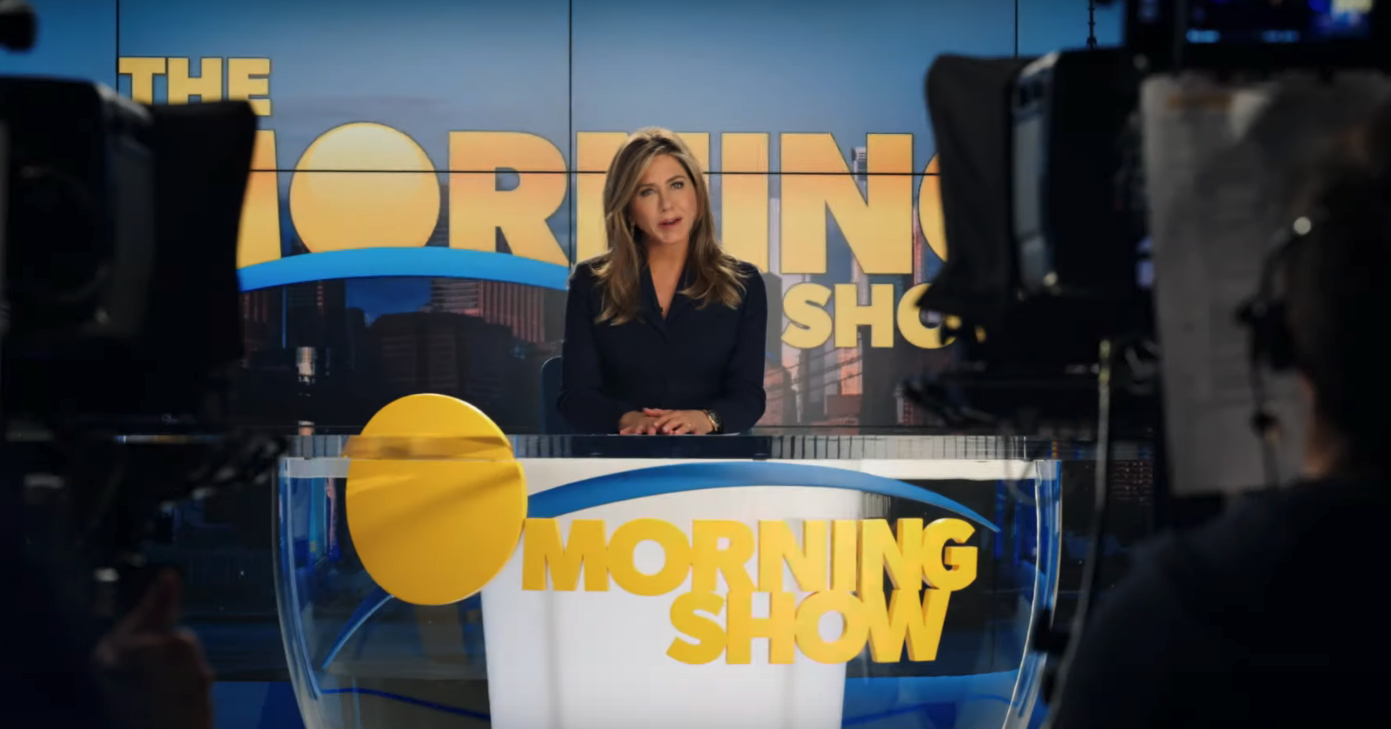
This article contains spoilers for ‘The Morning Show’ season 1.
The Morning Show is a show about gray areas. Taking place in the cut-throat world of live morning news programming, it tells the story of a beloved morning news anchor, Mitch Kessler (played by Steve Carell), who has a #MeToo reckoning. The story follows the chaos, destruction, and redemption that follow in the wake of the revelation. Two women find themselves at the heart of the storm, Jennifer Aniston’s Alex Levy, Mitch’s co-anchor of 15 years, and Bradley Jackson (played by Reese Whitherspoon), the young-blood brought in to disrupt the system.
The first few episodes of the show set the tone for most of the season. This is not going to be the morality-laden all-out condemnation that some may have wanted. This is a show where all sides of an argument are heard, where nuance is the point rather than an inconvenience, and there are no black and whites in the search for the truth.
Bradley Jackson, the Conservative-but-maybe-more-Libertarian reporter from West Virginia epitomizes the gray area that The Morning Show (TMS) would call it’s home. It’s quickly revealed that she had an abortion at the age of only 15. So much for Miss America.
In an increasingly polarized nation where lines are drawn and people are eviscerated for the tiniest ideological impurity, a fence-sitting show like TMS struggled to find its footing. When the first three episodes were made available for review before launch, critics were unimpressed. The early episodes seem awfully focused on presenting the point of view of Mitch, the alleged perpetrator. Although we are already three years out of the #MeToo revelations that rocked Hollywood, largely spurred by allegations against Harvey Weinstein, for some the empathetic look into the mindset of a serial workplace harasser may have seemed to be a little #TooSoon.
Episode one features Carell’s Mitch yelling about his innocence. “They liked it, I mean who are we kidding?” he insists, “I didn’t hold a gun to anyone’s head. It was consensual.”
Later, he insists to a distraught Alex that he is not the predator everyone has made him out to be, proclaiming, “You know I didn’t coerce anyone, this is Weinstein’s fault!” Alex’s response is unsympathetic, “Please don’t say that. It’s so ignorant.”
Episode two features a conversation between Mitch and the show’s producer, Chip, where Chip appears to express sympathy for Mitch in an attempt to placate him, “The whole MeToo movement is probably an overcorrection for centuries of bad behavior more enlightened men like you and me had nothing to do with.” This conversation highlights another common theme throughout the show: Good Men vs Bad Men, and the gray areas that exist between the two.
In perhaps his most tone-deaf moment, Mitch boldly compares the men canceled by #MeToo to Holocaust victims:
“At first they came for the rapist, and I did not speak up, because I am not a rapist. And then they came for the powerful men, and you did not speak up, because you are not a powerful man. But what are you going to do when they come for the ordinary, run the mill creep like you, Chip?”
The next episode shows Mitch meeting with a famous director, played by Martin Short, who was apparently canceled over sexual abuse allegations. While Mitch initially intends to vent about the unfairness of it all, the conversation turns dark when it is revealed the director abused a 15-year-old girl. Mitch quickly moves to separate himself from the other man, stating, “You’re an actual predator.”
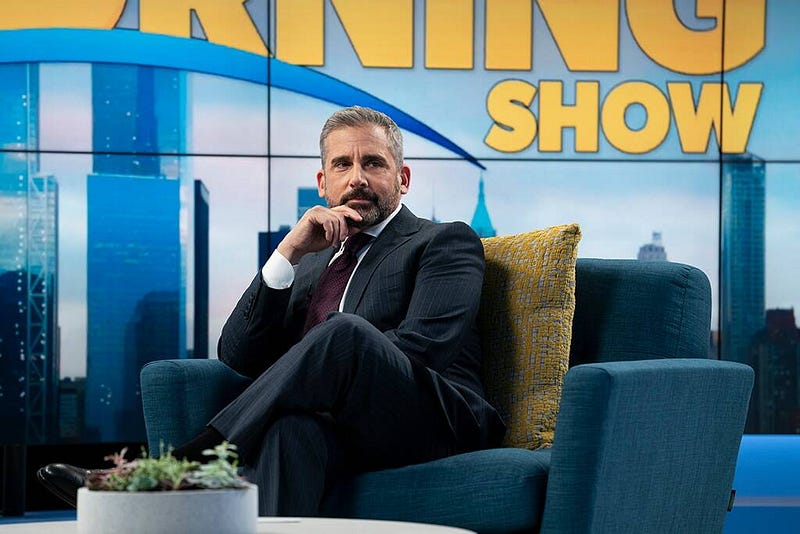
It’s no surprise that the initial release of these three episodes led many critics to write off the show for “ideological wobbliness.” “Apple’s The Morning Show is stuck between ‘both sides,’” declared one headline. Viewers want good guys and bad guys, heroes and villains.
But The Morning Show’s early setups serve an important role and pay off down the line.
While Mitch is insisting on his innocence in episode one, denying that he is the violent offender he is made out to be, he quickly turns to smashing a TV to smithereens in a truly perfect depiction of male rage. The very first proclamation of his innocence is undercut by his own actions mere seconds later.
This isn't the only time in the first episode Mitch’s actions reveal a hidden truth. When he tells Alex “It was consensual!” we almost immediately see him attempt to coerce her into staying at his house for the night after she expresses that she wishes to leave. He even threatens to kill himself in an attempt to keep her there, “Please stay! I’ve got a gun!” This is blatantly coercive behavior.
His actions again undermine the statements he has made only minutes before. Yet, the viewers (and critics) seem to take his words at face value.
“Why did so many early viewers believe Mitch’s words over the clearly abusive and violent actions which followed?”
It’s not until many episodes later that the truth of his actions are revealed. He did coerce Hannah. She did try to leave. He did rape her. If we judged Mitch by his behavior rather than his words in the first few episodes, we would not have been surprised by this revelation. The Morning Show forces us to confront our biases. Why did so many early viewers believe Mitch’s words over the clearly abusive and violent actions which followed?
Some have argued that Mitch was too likeable, causing viewers to empathize too much with a rapist — as if real-life rapists can not be likable and are not our friends, coworkers, brothers, boyfriends, and husbands. Men get away with rape and abuse because they are liked by their community every day.
It’s hard to not be reminded of Carell’s most famous character, Michael Scott, who is perhaps most well known for his “That’s what she said!” jokes in the workplace. Michael Scott blatantly sexually harassed his employees, at times rising to the level of sexual assault (although never rape), and we all let it pass because he is likeable, funny, damaged, and deep down really has a kind and generous heart. The Morning Show seems to provide an alternate universe where the stakes are high and consequences serious, while simultaneously pointing out that male likeability may be a major factor in sexual harassment being ignored.
Other gray areas explored in the show are those of different forms of power dynamics, and the role of women in upholding patriarchy. The relationship between Claire (Bel Powley), a young assistant, and Yanko (Nestor Carbonell), the network weatherman who’s twice her age, is meant to provide a foil to the other, different, inappropriate workplace romances. Their relationship is special. They are in love, everything is mutual and consensual.
Despite the fact that Yanko is Claire’s superior (by a few levels), Claire soothes Yanko’s worries by pointing out that her family is so rich they could buy and sell his family many times over. Her father has nothing to do with the network, but she insists she could have him fired if she wanted to. That’s how rich and powerful she is. “If there’s any power imbalance, it’s the one I have over you,” she coos in bed.
It’s meant to be a sweet moment, but only a few scenes before we saw Claire blatantly ignore his consent while hooking up in the office. Even after he used their safe word (“climate change”) she continued to kiss him.
Who’s the sexual predator now?
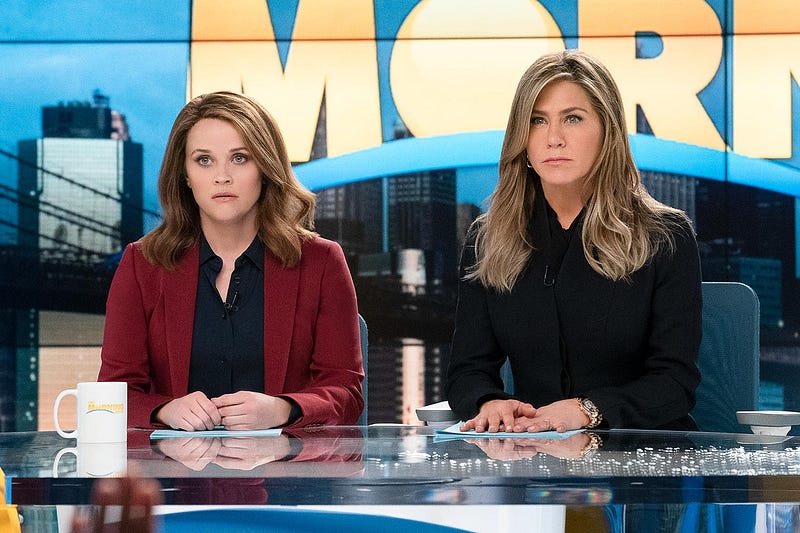
The show also forces women to confront their roles in upholding the patriarchy. Alex, in particular, is held to account for her knowledge of what was going on. There is also something to be said for the fact that the two most powerful women in the show have traditionally male names: Alex and Bradley. While Alex is a boy’s club insider and Bradley is an outside disruptor, they both use the chaos caused by the allegations to get ahead, even if somewhat unwittingly.
Although Bradley is often seen to be the empathetic “truth-teller” who is on the “human side” of the argument, we see her participate in the same cut-throat tactics to use women’s stories of sexual abuse for her own goals, quixotic as they may be.
Early episodes feature Hannah (Gugu Mbatha-Raw), a producer on the show, relentlessly pursuing Ashley, one of Mitch’s accusers. Hannah insists that Ashley should tell her story on The Morning Show rather than on their competitor. It’s hard to tell how sincere Hannah is being with Ashley. Hannah has been previously shown to be an aggressive and career-driven woman who is willing to burn even her friends to get ahead. Getting Ashley on The Morning Show would be a huge win for Hannah. Yet, as we later learn, Hannah may have her own reasons for wanting Mitch taken down on his home turf.
The pattern of women using other women’s traumatic stories to get ahead has practically become a TV Trope in the #MeToo era. HBO’s Succession featured an eerily similar scene where media heiress Shiv empathetically connects with a victim of sexual assault in order to convince her to “do the right thing,” which, of course, benefits Shiv and her family’s company.
In The Morning Show’s finale, a role-reversal places Hannah in the position of unwilling witness, and Bradley the one using her to achieve her own goal — taking down the head of the network, Fred, by exposing his role in covering for Mitch.
For a show that seemed married to gray areas, the sudden burst of black and white which follows is shocking.
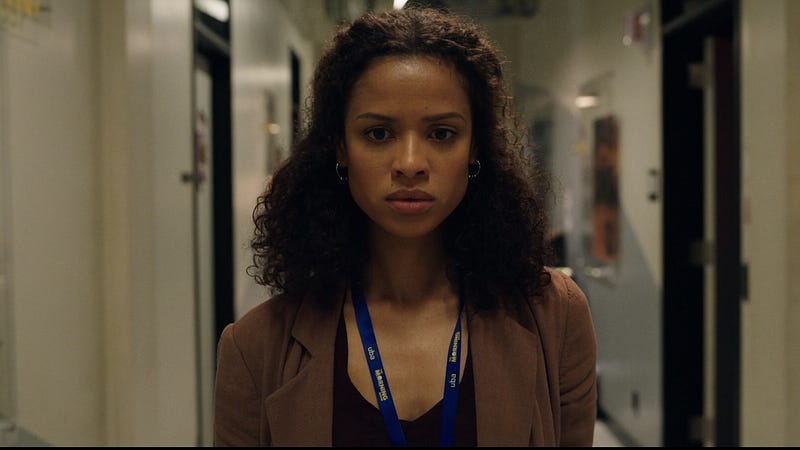
Hannah reveals the true depth of her trauma from her night with Mitch to Bradley, overdoses after Bradley leaves, and is found dead in the morning. Nothing gray about it. Hannah was a victim of Mitch, of a complicit network which traded her career advancement for silence, and of those who would relentlessly pursue her truth without a trauma-informed approach that would lead her over the edge.
Suddenly, the blurred lines that the show had been painting seemed to snap into focus — not just for viewers, but for Alex and Bradley, who each suddenly face their own reckonings. The warring duo finally teams up to expose the network executives for their role in allowing the culture of abuse to fester in a long-overdue act of female solidarity. The emotional ending begs viewers to “Come closer” and really, truly, face the harm that is done by likeable men and the cultures that enable them.
The Morning Show was accurate in its depictions of the gray area that can arise around conversations about #MeToo, sexual assault, workplace harassment, and rape. When Babe published the story of “Grace,” a woman who alleged Aziz Ansari had sexually assaulted her in 2018, the internet was abuzz with the debate over consent, gray areas, blurred lines, and what makes a “real” predator.
There is no answer to this question, but The Morning Show was never trying to find it anyway. By raising the debate TMS demonstrated just how much these questions are missing the point. Whether Mitch Kessler is ultimately a good or bad man does not matter. What mattered was the impact on his victims, the women we all mostly ignored, or used, until we couldn’t anymore.
Killing off Hannah will probably be criticized by those who are invested in their initial perception of the show. But for a story that existed solely in the gray area for so long, the sudden unshakability of death forced viewers and characters alike to have their own moment of clarity — and these are the moments that drive action and change.
The generous support of our readers allows 4W to pay our all-female staff and over 50 writers across the globe for original articles and reporting you can’t find anywhere else. Like our work? Become a monthly donor!
Enter your email below to sign in or become a 4W member and join the conversation.
(Already did this? Try refreshing the page!)


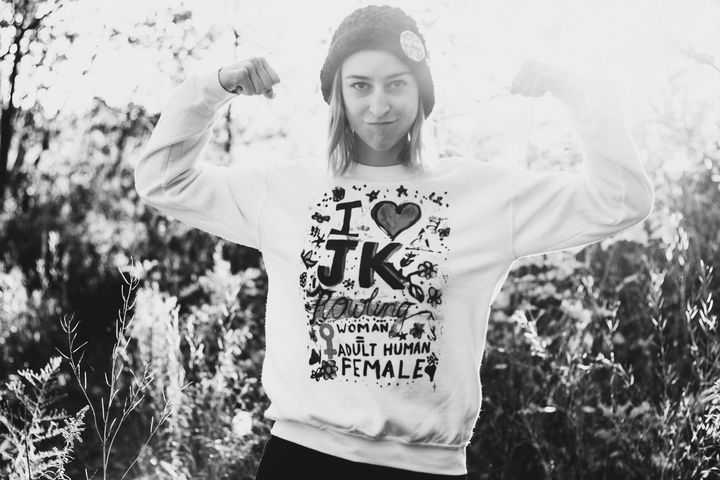
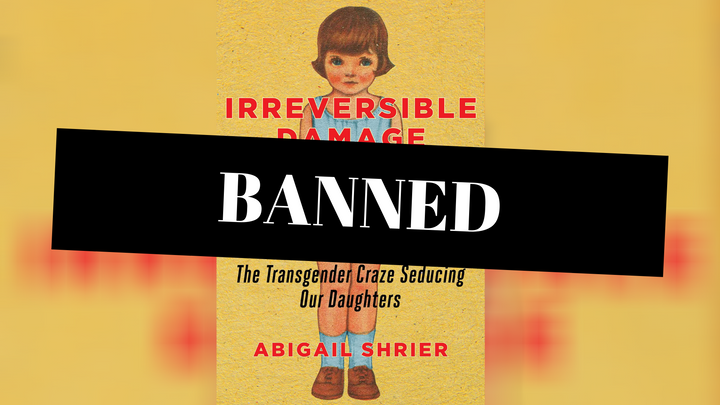
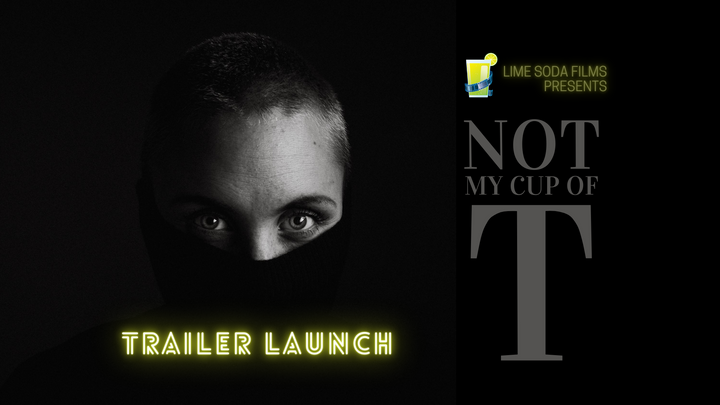
Comments